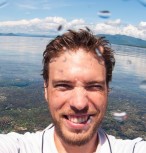DNA reveals the past and future of coral reefs
New DNA techniques are being used to understand how coral reacted to the end of the last ice age in order to better predict how they will cope with current changes to the climate. James Cook Univer

From 2005 to 2022, the main node of the ARC Centre of Excellence for Coral Reef Studies was headquartered at James Cook University in Townsville, Queensland (Australia)








Abstract: Understanding the distributions of plants and animals is the fundamental goal of ecology, and the depth zonation of reef-building corals is one of the most prominent patterns in nature. After initial investigations revealing that the depth distribution of some reef coral species extended to over 90 metres in the 1960s, interest in this topic stalled in the mid 1980s. Although the results with respect to diversity were inconsistent, a prevalent ‘hump-shaped’ pattern emerged, consisting of a peak in species richness and diversity at mid-depths of 15 to 35m. This pattern was explained as the result of increased disturbance in shallow water, and decreased productivity in deep waters, creating an intermediate zone of high diversity. However, alternative explanations for this peak, such as mid-domain effects, were never examined, and it is now recognised that much of these early data were flawed due to disparate sampling effort and methodology, and significant recent changes in coral taxonomy. While a strong zonation pattern of species was apparent, no attention was given to the structure of the pattern, nor as to how individual species utilise bathymetric space. This project will re-visit the distributional patterns of coral species over depth, and investigate the processes that modulate how species utilise vertical space. To do this, I will assemble a new dataset detailing the distribution and abundance of photosynthetic scleractinian corals over a 40 m depth range. This will be used to re-assess the pattern of diversity over depth, and the structure of this pattern (using nestedness analysis). Where previous studies described species depth specialisation using only total depth range, I will analyse the level of specialisation in each species through the relative abundance within the total range, using a newly developed beta function. This information will then be used in combination with a new traits database (CoralTraits), to reveal life history traits characteristic of species with contrasting depth distributions. Finally, I will assemble population demographics of growth, mortality, fecundity, and recruitment, over the depth range of three representative species to describe the population performance over depth. My approach will utilise existing methodology, and novel data to emphasise the importance of depth to coral reef ecology, and bring the field back towards a 3D ecosystem.
Biography: Ed was raised in Sydney, and moved north to Townsville in 2005 to attend JCU. After working as a SCUBA instructor for a year in 2008, he spent the next three years maintaining coral reef aquaria at ReefHQ. During this time he escaped on research expeditions to the Coral Sea, and Far Northern GBR, becoming increasingly involved in the deeper regions of coral reefs. After leaving ReefHQ in 2011, he decided it was about time to finish uni, and returned to JCU. In 2013 an opportunity to research largely unknown submerged reef habitats on the GBR arose, and this became the subject of his honours thesis. He graduated with first class honours in environmental science in 2013, and was successful in acquiring an AIMS@JCU PhD scholarship in 2014. He started his PhD in February 2014 under the supervision of Professor Andrew Baird, Dr Tom Bridge, Professor Geoff Jones, and Dr Julian Caley.
New DNA techniques are being used to understand how coral reacted to the end of the last ice age in order to better predict how they will cope with current changes to the climate. James Cook Univer
A new study on the effects of climate change in five tropical countries has found fisheries are in more trouble than agriculture, and poor people are in the most danger. Distinguished Profess
James Cook University researchers have found brightly coloured fish are becoming increasingly rare as coral declines, with the phenomenon likely to get worse in the future. Christopher Hemingson, a
Researchers working with stakeholders in the Great Barrier Reef region have come up with ideas on how groups responsible for looking after the reef can operate more effectively when the next bleaching
Abstract: As marine species adapt to climate change, their heat tolerance will likely be under strong selection. Individual variation in heat tolerance and its heritability underpin the potential fo
Abstract: The Reef Ecology Lab in KAUST’s Red Sea Research Center explores many aspects of movement ecology of marine organisms, ranging from adult migrations to intergenerational larval dispersal
Abstract: Macroalgal meadows are a prominent, yet often maligned component of the tropical seascape. Our work at Ningaloo reef in WA demonstrate that canopy forming macroalgae provide habitat for ad
Abstract: Sharks are generally perceived as strong and fearsome animals. With fossils dating back at least 420 million years, sharks are not only majestic top predators but they also outlived dinosa
Abstract: Connectivity plays a vital role in many ecosystems through its effects on fundamental ecological and evolutionary processes. Its consequences for populations and metapopulations have been
Abstract: Evolution of many eukaryotic organisms is affected by interactions with microbes. Microbial symbioses can ultimately reflect host’s diet, habitat range, and even body shape. However, how
Abstract: The past few years have seen unprecedented coral bleaching and mortality on the Great Barrier Reef (GBR) but the consequences of this on biodiversity are not yet known. This talk will expl